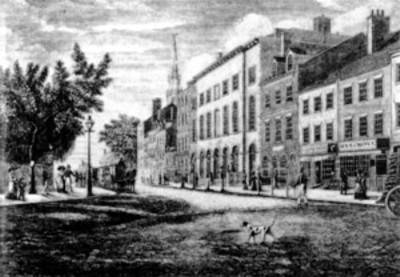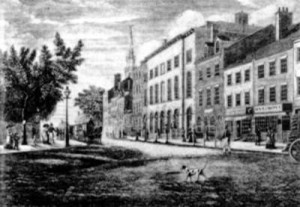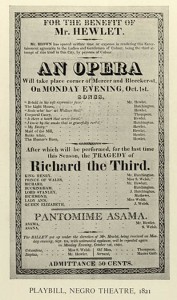
GOOD MONDAY MORNING, P.O.U.!
This week’s series will take a look at Black Shakespearean Actors.
THE AFRICAN GROVE THEATRE

The African Grove was a theatre founded and operated by free African Americans in New York City in 1821, six years before enslavement of blacks fully ended in New York state (gradual abolition brought it to an end in 1827, but young people had to serve apprenticeships to age 21.) The young Ira Aldridge was said to have played at the African Grove. He emigrated to England, where he became renowned as a Shakespearian actor, and toured successfully in Russia and Europe.
For some years, the African Company—the company of the African Grove—played with a black cast and crew to mostly black audiences. It was the third of at least four attempts to create a black theater in the city, and the most commercially successful.[1] After a few years, city officials shut down the African Grove, because of complaints about conduct: conduct that was normal among working-class white New York theatre audiences of the time was considered unacceptably boisterous when displayed by blacks.[1] One source says that the theatre was “mysteriously burned to the ground in 1826”,[2] but it appeared to have failed financially well before that.[3] “There are no records of the African Grove Theater after 1823.”[3]

The theatre was founded by William Alexander Brown and James Hewlett, both ships’ stewards. Through their work, they traveled to England and the Caribbean, so they had a broader opportunity to see theatre than the typical New Yorker and cosmopolitan experience. The West-Indies-born Brown left a job on a Liverpool ship and bought a house in New York, at 38 Thompson Street. At the start, Brown held the African Grove in his back yard, where he offered food and drink, but also poetry and short drama pieces. At the suggestion of Hewlett, both an entertainer and a regular customer, together they hired other black actors.[3]
The theater’s repertoire drew heavily on Shakespeare, with comic entr’actes. White audience members were confined to a separate section because, in the words of the theater’s management, “whites do not know how to conduct themselves at entertainments for ladies and gentlemen of color.”[1] The most popular plays were Richard III and Othello. James Hewlett was the first black man of record to play the leading role in Othello.[4]
As was common at the time, the producers made adaptations to Shakespeare’s plays. Small casts and smaller budgets required expedients such as that described by the reviewer George Odell, writing of an 1821 performance of Richard III: “A dapper, wooly haired waiter at the City Hotel personated the royal Plantagenet in robes made up from discarded merino curtains of the ballroom. Owing to the smallness of the company King Henry and the Duchess were played by one person, and Lady Anne and Catesby by another. Lady Anne, in Act III, sang quite incongruously.”[3][5] The scholar Laura V. Blanchard identifies Odell’s “dapper waiter” as the actor James Hewlett.[6]
Frequently harassed by the police, and facing increasing hostility from the white populace, the company moved several times, from Thompson Street “to the Pantheon Theater on Mercer Street between Bleecker and Prince, to Houston and Mercer near the Park Theatre, to One Mile Stone on Broadway between Mercer and Prince, and finally to a rural site north of 14th Street”. With a smallpox epidemic in 1822, people may have been reluctant to go that far.[3] When the Park Theatre—New York City’s leading theater of the time— put on Richard III starring the English tragedian Junius Brutus Booth,[6] the African Company rented a hall next door for its own production of the same play the same night. Theatrical competition was stiff; Stephen Price, owner of the Park, orchestrated (and paid for) a disturbance over the rival productions so that the police would shut down the African Grove.[3][6]
In addition to Shakespeare, the African Company performed original works, which included William A. Brown’s now-lost play, The Drama of King Shotaway. It was about a 1796 uprising of black Caribs against British Navy forces on the island of Saint Vincent.[6] Produced by the African Company in 1823, Drama is believed to have been the first full-length play by an African American performed in the United States.[6]
Despite the frequent changes in location and short lived existence, the African Grove Theatre was important because it was a launching pad for famous African-American actors. Not only James Hewlett, but also Ira Aldridge, who achieved international fame throughout America and Europe.
(SOURCE: Wikipedia)
THE ASTOR PLACE COMPANY OF COLORED TRAGEDIANS
Although the inclusive dates of this noteworthy early African American theatre group are generally given as 1884/88, this company actually began its operations in 1878 as an unnamed colored troupe of actors headed by *Benjamin J. Ford, who in that year presented Shakespeare’s Richard III at the Lyric Theatre on Sixth Ave. in NYC. In 1884, it was reorganized by *J.A. Arneaux as the Astor Place Colored Tragedy Company, taking its name from the location of its rehearsal theatre, the Grand Central Th., in Astor Place, near Broadway. On June 17, the newly named troupe presented Shakespeare’s Othello at the Brooklyn Anthenaeum before an audience of 300, with Ford in the title role, *Alice Brooks as Desdemona, and Arneaux as Iago. After performing the play at several other theatres in NYC, the troupe began experiencing severe financial problems and ceased its operations for about two years until these conditions had considerably improved. Beginning in mid-1885, the company revived Othello and Richard III in repertory and performed these two plays at various theatres in New York, New England, and Pennsylvania until 1888. Arneaux now played the role of Richard, replacing Ford; and *Eloise Molineaux replaced Alice Brooks in the role of Desdemona. These productions were, for the most part, favorable reviewed (though often with tongue in cheek) in local newspapers, and Arneaux received some excellent notices for his performance of Richard.
